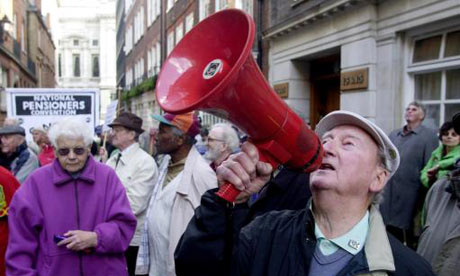Former head of the Communist party of Great Britain

Gordon McLennan on a pensioners' march in 2003.
Gordon McLennan, who has died aged 87 of cancer, was the penultimate general secretary of the Communist party of Great Britain. By the time he was elected to the post, in 1975, the party's glory days were behind it and the war between the traditionalists and the Eurocommunists was already well under way. McLennan saw it as his task to end the war and to pass the party on to his successor in good condition, and devoted himself to this objective throughout his 15-year leadership. He failed, not through lack of commitment, but because it was impossible. As soon as he was appointed, John Gollan, his predecessor as general secretary, confided a big secret: that ever since 1956, the party had been receiving money from the Soviet Union – wads and wads of banknotes, handed over in clandestine meetings between an embassy official and Gollan's deputy Reuben Falber. In the early days, it had been about £100,000 a year, but was now down to about £14,000. McLennan always insisted that he told Gollan he wanted the practice stopped, and thereafter assumed it had been, though in fact it carried on for four more years until 1979. The year after McLennan became general secretary, the CPGB sold its biggest asset, its substantial headquarters in King Street, Covent Garden, bought in the 1920s with money secretly sent by Lenin, and moved into more modest premises. Membership was declining, and, like the rest of the left at the time, the CPGB seemed to be engaged in a hideous struggle to strangle itself. What was McLennan to say when the Soviet Union invaded Afghanistan? Either condemning or defending was fraught with danger. In Moscow in 1981, he demonstrated greater independence than any previous British communist leader, condemning his hosts for trying to dictate policy to communists abroad. McLennan tried desperately to reconcile the two factions, deciding that if the party were to have a future, it must move cautiously in the Eurocommunist direction, which seemed like treachery to some of his old friends. But he could not control the communist newspaper, the Morning Star. The idea of distancing the paper from the party, which had seemed clever in 1946, meant that the paper could take its own line. McLennan was reduced to trying to get his supporters elected to the paper's management committee. He took on the battle with great courage. One of his allies told me about the meetings to elect the paper's management committee: "They were hissing and booing at Gordon, shouting traitor, all sorts of things. It was a generation that came through 1956 and Gordon was part of it and was working-class, so they were saying he should be on their side, not siding with these young intellectuals." McLennan found himself in charge of the offices and businesses controlled by the CPGB, but with the other side controlling the valuable Farringdon Road building that housed the Morning Star. He was reduced to conducting great Soviet-style purges of party members. During the 1984-85 miners' strike, McLennan feared that Arthur Scargill was leading the miners to disaster, and after the strike, McLennan and his industrial organiser Pete Carter met Scargill and Mick McGahey. McLennan told me it was a "discussion about how to win unity of the miners in the post-strike situation", but it was a furious row. He struck up a good relationship with Mikhail Gorbachev, advising the Soviet leader to try to reach an understanding with Margaret Thatcher, and receiving advice on how to deal with his fractured party. He retired as general secretary in 1990, to be replaced by Nina Temple, who had long believed that McLennan's peace mission was doomed to failure. The party wound itself up the next year, and Temple and her supporters used its remaining assets to start an organisation called Democratic Left, which McLennan refused to join, throwing in his lot with the Communist party of Scotland instead. In retirement McLennan threw himself into work with the National Pensioners Convention, becoming a member of its national executive and chair of its branch in Lambeth, south London, where he lived. Born in Glasgow, McLennan became an engineering draughtsman, and joined the Young Communist League at the age of 15, serving on the YCL executive committee from 1942 until 1947, before becoming a full-time CPGB organiser in Scotland. He married Mary in 1950, beginning a strong, lifelong partnership, and rose within the party to become its national organiser in 1966. When Gollan was diagnosed with lung cancer in 1975, McLennan was the obvious candidate to replace him. In private life, he was a kindly, likable man, devoted to his family and determined to protect them from the pressures of his political life. Though he was attacked more stridently than most politicians, he never bore grudges, and treated everyone the same, whether Gorbachev, Gordon Brown or Lambeth pensioners. He and Mary were renowned for singing duets of Scottish songs at political and family gatherings. One of his sons, John, has Down's syndrome, and McLennan never allowed the pressures of his job to prevent him from giving John his time and love. He is survived by Mary, their three sons and one daughter, seven grandchildren and two great-grandchildren. • Gordon McLennan, political organiser, born 12 May 1924; died 21 May 2011
No comments:
Post a Comment